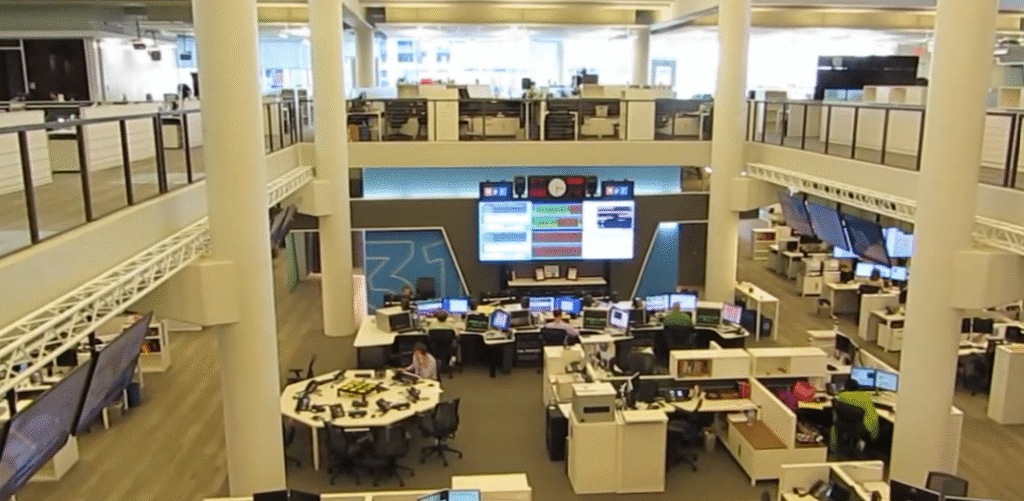In a rare situation where two organizations that have long been viewed as allies end up on opposing sides of a courtroom, the NPR CPB lawsuit has developed into one of the most significant conflicts in contemporary public media. What started out as a disagreement over financing for a satellite distribution system has developed into a discussion about accountability, independence, and what public service is all about.
It revolves around a $57.9 million contract that NPR claims the Corporation for Public Broadcasting improperly canceled. The agreement would have extended NPR’s control over the Public Radio Satellite System (PRSS), which serves as the backbone for the delivery of national news, podcasts, and programming to almost 250 local radio stations. According to NPR, CPB’s board abruptly changed its mind after approving the funding in early April after meeting with a senior White House budget official who claimed to have a “strong distaste” for NPR.
CPB’s decision was made just days after President Trump publicly demanded that NPR and PBS lose all federal funding, according to court documents. According to NPR, the timing was strikingly similar to other cases where institutional behavior was dictated by political influence. They contend that this was a pattern of retaliation against perceived bias rather than a coincidence.
Key Individuals & Organisations
| Name or Organisation | Role / Title | Link for Reference |
|---|---|---|
| National Public Radio (NPR) | U.S. public radio network, plaintiff in the lawsuit | https://www.npr.org |
| Corporation for Public Broadcasting (CPB) | Non-profit grant-making entity distributing federal funds to public broadcasters, defendant in the dispute | https://en.wikipedia.org/wiki/Corporation_for_Public_Broadcasting |
| Katherine Maher | Chief Executive Officer of NPR | https://en.wikipedia.org/wiki/Katherine_Maher |
| Patricia Harrison | President & CEO of CPB | — (Relevant filings cited in news sources) |

For its part, CPB maintains that principles, not politics, guided its choice. The organization argues that in order to better serve the nation’s diverse network of stations, it decided to form Public Media Infrastructure (PMI), a new, independent consortium that includes American Public Media, PRX, and New York Public Radio. CPB argued that NPR’s control over satellite operations had gotten monopolistic and was impeding innovation, calling its claims “an over-caffeinated conspiracy theory.”
The courtroom drama is part of a larger story about the financial instability of public media. CPB has acted as the go-between for the distribution of federal funds to NPR and PBS since its creation under the Public Broadcasting Act of 1967. That collaboration served as a symbol of journalism’s ability to resist political and corporate domination. However, the relationship between independence and oversight has grown more strained as funding has decreased and political polarization has intensified.
Court-submitted emails reveal the emotional strain in CPB leadership. Patricia Harrison wrote, “The wolf is really coming,” to NPR’s Katherine Maher in one of her messages, expressing her concern that political pressure might cause CPB to be dismantled. This sense of urgency highlights the challenge facing public institutions in a time when political allegiance frequently takes precedence over public purpose.
According to NPR, CPB’s reversal was especially damaging because it called into question forty years of cooperation. According to the lawsuit, CPB essentially endangered the stability of a whole communication system that provides millions of listeners with trustworthy information by denying NPR the PRSS contract. Such a disruption is symbolic as well as administrative in an era where false information is disseminated at a never-before-seen pace.
The case also makes NPR wonder who gets to decide what is in the “public interest.” From investigative reporting to local news, the organization claims that its operations depend on a framework that ought to be unaffected by changing political tides. According to NPR, CPB’s action is a surrender, a submission to outside pressure that erodes the confidence of reporters and viewers alike.
The ramifications are not limited to the courtroom. NPR’s network provides public radio stations in rural areas and small towns with access to top-notch programming. Many worry that if funding distribution shifts hands, access may be limited or services may become fragmented. This change may be especially harmful to communities where the public media is still the most reliable source of information.
The NPR CPB lawsuit, according to observers, is strikingly similar to other well-known conflicts in which editorial integrity was threatened by political meddling. The distinction between supervision and control becomes perilously blurred when governments or significant funders get involved in the distribution of content. Therefore, the lawsuit is about defending the common idea that journalism should serve listeners, not administrations, rather than just contract law.
However, CPB has a strong case of its own. According to the agency, the system requires a more inclusive model that isn’t controlled by a single organization because of the rapid advancement of technology and the decline in federal support. That vision—a cooperative framework involving several organizations to allocate programs and oversee infrastructure—is embodied in the creation of PMI. According to CPB, this change could be very effective in meeting the changing demands of digital broadcasting.

